20—2—20: Professor of St Petersburg University Sergey Aplonov speaks about the essential aspects of Arctic research

At a press conference held by the Russian News Agency TASS, Professor Sergey Aplonov, Doctor of Geology and Mineralogy, Director of the Arctic Research Centre at St Petersburg University, spoke about the contribution of the University scientists to Arctic research initiatives.
‘The significance of the Arctic and Arctic research for our country is clearly reflected in three figures: 20 — 2 — 20. What do they refer to? First of all, approximately 20% of Russia’s landmass is in the Arctic. Secondly, just over 2% of the population of Russia lives in this area, including the indigenous population and those who work in the region and study it. Importantly, this makes up half of the entire population of the Arctic,’ Sergey Aplonov stressed. ‘Thirdly, the Arctic zone of Russia forms 20% of the federal budget revenues. These figures not only indicate the importance of the Arctic region for our country, but also the relevance of multifaceted research in the Arctic.’
Professor Aplonov added that due to the fact that St Petersburg University is a classical university, it conducts scientific research and provides training on a broad range of Arctic-related subjects: from geology and mineral resources; logistics systems of the Northern Sea Route and Arctic medicine; to the study of monuments of wooden architecture of the Russian North.
Today, Arctic research is moving towards more interdisciplinary endeavours; hence, professionals with diverse, interdisciplinary expertise are in demand. Gone are the days when a complex issue would have been solved by a team of specialists from different disciplines. Nowadays, we need experts who are equally well-versed in a few related fields.
Professor Sergey Aplonov, St Petersburg University
I will give you an example. For the successful development of the Arctic shelf hydrocarbon resources, it is essential that the project should be carried out jointly by: geologists; oil producers; economists; environmentalists; and lawyers. Since most of St Petersburg University academics are active researchers, they able to tailor academic programmes of various levels to specific needs and conditions.
Answering the question about the labour market demand in the Arctic zone, Sergey Aplonov emphasised that the regional job market is rapidly changing; hence, the expert advice of employers in the Arctic regions should always be sought.
It is for this reason that St Petersburg University has long been following the principle of mandatory employer involvement in the design, approval, and regular evaluation of academic programmes. Also, representatives of employers participate in the assessment of students’ graduation projects as members of state assessment committees.
As a reminder, the Arctic Research Centre at St Petersburg University was established in 2019. Its main tasks are to coordinate and support the ongoing Arctic research implemented by the University and develop multidisciplinary research initiatives that substantiate research and educational priorities for the development of the Arctic zone of the Russia Federation. The Centre also provides expert assessments on sustainable development of the Arctic and the North.

